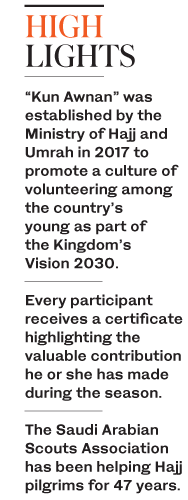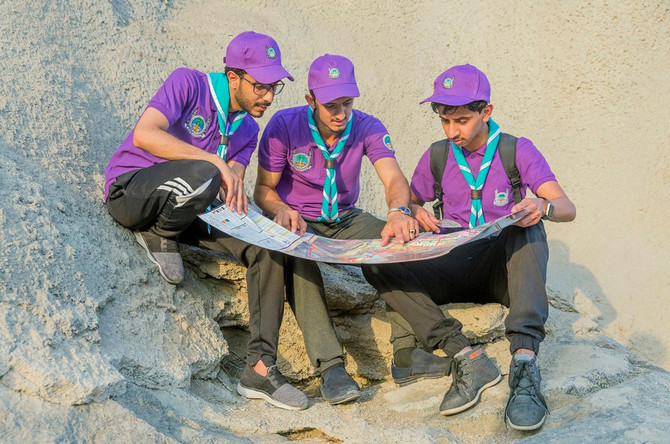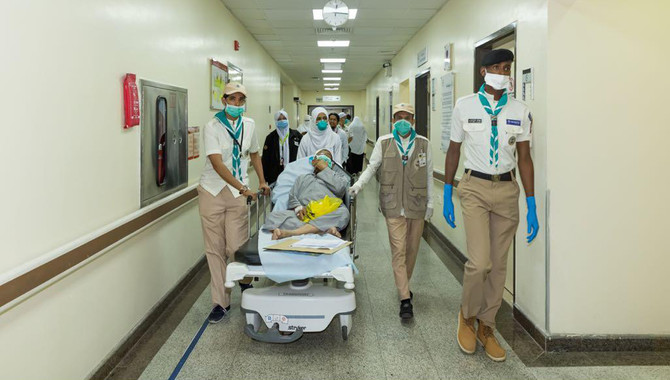JEDDAH: Every year, Saudis — many of them young people — gather from all over the Kingdom to help their Muslim brothers and sisters fulfill their lifetime dream of visiting Makkah to perform Hajj, the fifth pillar of Islam.
With the support and the supervision of the Ministry of Hajj and Umrah, volunteers participate in all different kind of activities to ensure pilgrims’ comfort, receiving them with hospitality and generosity at the country’s ports.
All governmental and private bodies, including Scouts, join self-motivated volunteers to provide services such as traffic control, health care, guidance and support to various public sector agencies participating in the massive pilgrimage operation.
In 2017, the ministry approved the launch of the volunteering program Kun Awnan, or “Be Helpful,” to serve pilgrims.
“This program is in line with the Kingdom’s Vision 2030 to rally one million volunteers per year,” Hani Abu Alsaud, the program’s CEO, told Arab News.
Through this program, the ministry aims to promote a culture of volunteering, while providing young people with a chance to use their expertise and skills to assist pilgrims while doing everything they can to make the experience of God’s guests smoother and more secure.
The program assigns volunteers to different locations based on their skills, experience and, in some cases, their place of residence.
Volunteering points or camps include the holy mosques of both Makkah and Madinah, King Abdulaziz International Airport in Jeddah, Prince Mohammad Bin Abdulaziz International Airport in Madinah and the holy sites in Makkah.
“Last year, we received more than 3,000 volunteering applications through our newly launched website and we could accept only 12 percent of the total applicants,” Abu Alsaud said.
“Most of our volunteers are college and university students from all over the country ... (who) come to participate in the pride of serving God’s guests, and every one of them will receive a certificate of participation,” he said.
Kun Awnan activities include receiving pilgrims at airports, providing translations in a wide range of languages, doing all possible to make the Hajj experience go smoothly, as well as guiding activities and ceremonies after the season is over.
Scout camp activities were also launched to serve pilgrims during this year’s Hajj season under the Saudi Arabian Scouts Association.
More than 4,500 Saudi Scouts and Guides were deployed in the public service camps for pilgrims in Makkah and its holy sites to assist pilgrims in cooperation with the ministry.
Zaiad Qadeer, director of the scout activities at the department of education in Makkah, said: “Scouts come from several cities across Saudi Arabia and are trained to speak multiple languages. This comes as a big help for pilgrims who arrive from all over the world.
“Our main role would be assisting pilgrims who might lose their way around the holy sites in Makkah during the Hajj performance.”
As part of their efforts to provide the best possible services, six scout camps have been established in Makkah and its holy sites.
“Scouts have been active members of the volunteering activities for years, deployed in almost all locations and working side by side with other teams and agencies to provide assistance to pilgrims and receive them with hospitality and generosity,” Qadeer explained.
“We also help the Ministry of Health to treat sick pilgrims, complementing a number of voluntary humanitarian services for pilgrims.”
The General Directorate of Civil Defense plays a major role in volunteer work in the Kingdom.
Operations General Hamoud bin Suleiman Al-Faraj told local media that the civil defense hoped to increase volunteer work under its umbrella, and had witnessed a large increase in the number of volunteers participating in the Hajj within a year — 1,485 volunteers this year compared with 816 volunteers in 2017.


































